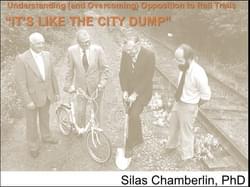




Learn the historical and contemporary sources of grassroots opposition to rail trails and several principles for accommodating critics.

Presenter: Silas Chamberlin, PhD, Regional Advisor, Pennsylvania Department of Conservation and Natural Resources
Despite the proliferation of rail trail projects throughout the country, many trail developers face criticism from from small but vocal groups who believed trails violate private property rights and attract crime, vandalism, and other nuisances. Only by understanding the origins of this opposition can trail developers anticipate, and when possible, accommodate the critical reactions to railroad abandonment, and public ownership. Learn the historical and contemporary sources of grassroots opposition to rail trails and several principles for accommodating critics.